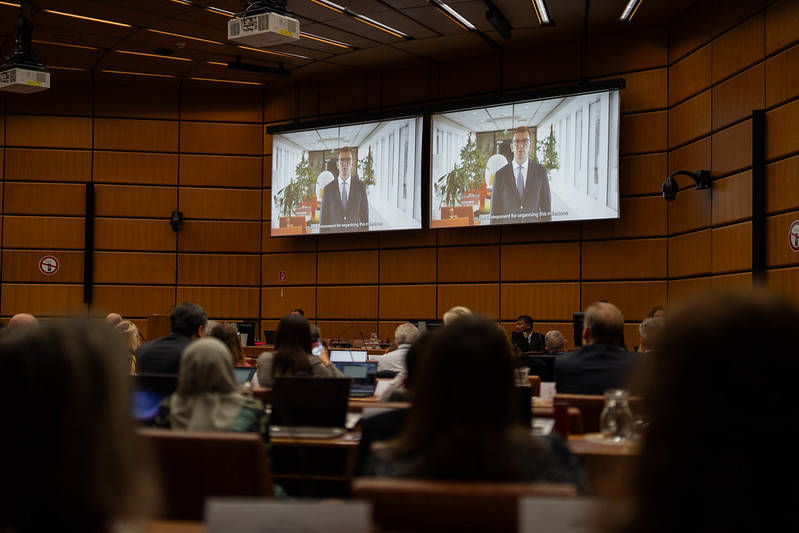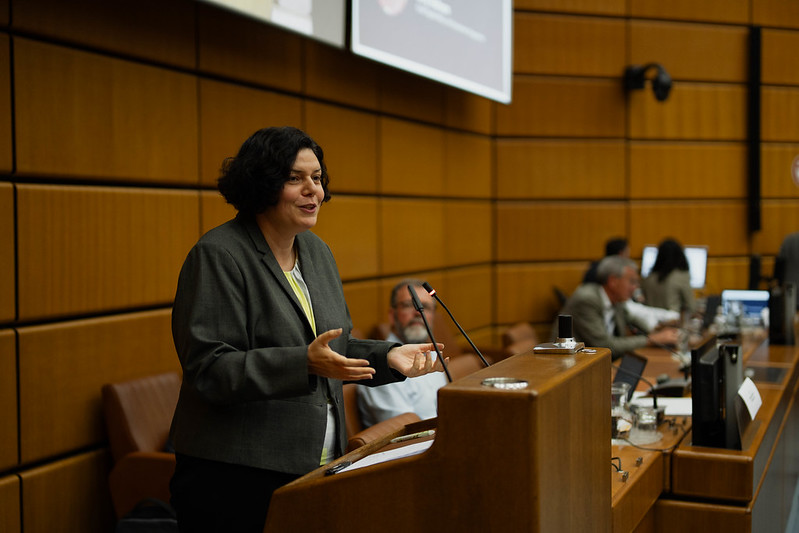Over 100 experts from finance, government, international organizations, business, Big Tech, the Earth observation community, research, citizen science, and other sectors gathered in Vienna, Austria, from 11-13 September for The Data for the Environment Alliance (DEAL) initiative’s Expert Group Meeting. DEAL is a Member-State-led global cooperation initiative initiated by the Government of Estonia and partners representing 34 countries. It is facilitated and supported by the UN Science-Policy-Business Forum (UN SPBF).
The wide-ranging expertise of the Expert Group provided a unique opportunity to examine the challenges associated with using data for sustainable decision-making. “The world is not on track to meet any of the environmental goals,” Shereen Zorba, Executive Secretary of the UN SPBF, reminded the audience in welcoming remarks, and “changing the current trajectory requires more robust science-based policymaking, stronger accountability, greater transparency, and inclusion.” “Because we cannot manage what we cannot measure,” she continued, “it is vital to ensure the availability of reliable, real-time data not only on the state of the planet, but on our performance as governments, industry, finance sector, consumers, clients, and citizens.”

Abdallah Mokssit, Executive Secretary of the Intergovernmental Panel on Climate Change (IPCC), then distinguished between two types of data: “science for data, and data for science.” The IPCC, he continued, relies on both: it relies on a significant amount of data collected from various sources, including satellite data and socioeconomic data; and, in turn, research addresses data gaps and informs data collection priorities and strategies. “[The challenge] is not just about managing data, it is also about collecting data where there are data gaps;” an issue that, he understored, particularly affects regions in the global South.

Further welcoming remarks were delivered by Niklas Hedman, Chief of Committee, Policy and Legal Affairs Section, United Nations Office for Outer Space Affairs, who noted that “space data has, and will continue, to become increasingly important for big data and its implication for the natural environment and our world that depends on it.” Satellites in orbit, he highlighted, offer reliable, reproducible, and comparable data, thus enabling the monitoring of trends over time.

Estonian Climate Minister Kisten Michal reminded the audience that Estonia and the UN SPBF launched DEAL in March 2022 with the aim “to support the development of the global environmental data strategy and support the work of data-driven strategy.” “This meeting,” he added, “represents an opportunity to regain momentum for the DEAL in the global data community and to position its leadership in the whole United Nations system.”

Over the following three days, over 100 experts offered their take on key insights, opportunities, and challenges. Pointing to the state of environmental data governance today, Holger Harreis. Senior Partner, McKinsey & Company, noted that “parallels can be drawn with the meltdown of the 2008 economic crisis. There were no global standards on measuring risk in the banking sector: everyone was doing it differently.” He called for the establishment of a “north star” in environmental data governance, that would guide ethics, standards, and behaviors. Levent Ergin, Global Chief Strategist for ESG Sustainability, Informatica, similarly noted, “With ESG, we are where we were 20 years with financing reporting.” He discussed potential paths forward, such as leveraging the data that companies will provide to adhere to the newly issued standards by the International Sustainability Standards Board (ISSB). These standards are designed to enhance disclosures related to sustainability in global capital markets.
In plenary and breakout sessions, experts envisioned and called for a robust framework to facilitate the transparent and granular sharing of data while upholding data quality standards and mechanisms to understand existing gaps and vulnerabilities better. Dialogue among experts from different sectors enabled the identification of critical issues. One key point that emerged is that even though a wealth of data is available, obtaining it at the desired level of granularity can be costly or requires navigating a complicated digital environment lacking a centralized catalog. Christian Hauglie-Hanssen, Director General, Norwegian Space Agency, underlined obstacles to creating valuable data for end-users from satellite data, noting that “government funding can act as a critical link between the service provider and end users.” “Elements such as transparency, communication, free access to data, local involvement, and engagement of industry appear fundamental to make this work,” he added.
The meeting had a significant representation of UN agencies. David Jensen, Digital Transformation Global Coordinator, UN Environment Programme (UNEP), underlined that “MEAs are not fit for purpose in the digital age [but that] digital technologies could have a transformative impact on the implementation of MEAs,” adding that private-public partnerships are “key” in the process. Speakers from citizen science noted the importance of citizen involvement through education and the collection of local data, and of the dissemination of information that empowers individuals to make environmentally informed decisions. There was a recognition of the pressing need to improve data availability in vulnerable regions, which often lack the critical information necessary for preparedness and effective response.
At the conclusion of the meeting, Experts heard from Sally Radwan, Chief Digital Officer at UNEP, who noted meeting discussions had identified ways forward in four areas: on standards and data exchange, Experts cautioned against “reinventing the wheel,” as standards do already exist, but offered productive suggestions such as creating thematic standards while recognizing differences in how data is collected around the world; on quality, they raised the need for a global clearinghouse for environmental data; on digital infrastructure, they warned this can be sometimes overlooked in discussions about data; and on sustainability, Experts had underscored the need to make the production and usage of environmental data sustainable with, among others, recommendations on how to optimize the supply chain of data. Sally Radwan then proposed the Expert Group identify several use cases – or specific data types – that can be used as pilots for data standardization. These could, she added, serve as the basis for a proposal to submit to Member States at UNEA-6.

At the end of the meeting, the Expert Group was declared “in session,” with Shereen Zorba highlighting the next steps.